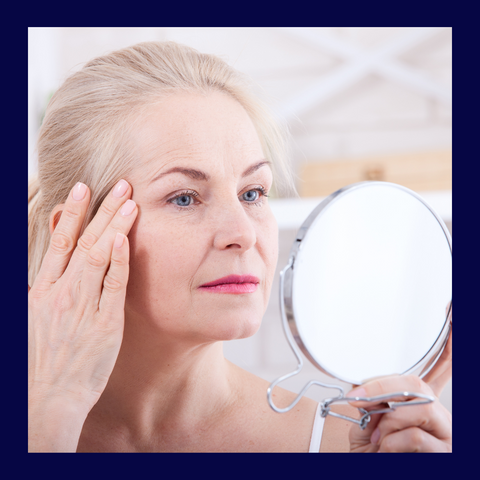We see this word everywhere… ‘Collagen’ seems to be written on every box, bottle, and packet we see in the pharmacy - especially the ones aimed at women of a certain age!
Many products claim that collagen can turn back the years, prevent wrinkles and restore elasticity to ageing skin.
But what exactly is the reason we see these words so often on packageing together - ageing, collagen, menopause?
We’re here to answer all your burning questions, from “what’s the best collagen for menopause?” to “do collagen supplements increase estrogen?”
What is collagen?

Collagen is a protein. Simply put, it is an essential part of almost every cell in the human body. Think of it like the glue that holds everything that makes you together, from your hair and skin down to your bones.
Although collagen is essential, not everyone produces as much as they need. As we get older, our bodies become less efficient at extracting the necessary collagen from our diets, and the hormonal changes associated with menopause can reduce this even further.
How can I increase my collagen intake?
You see the benefits of collagen advertised on loads of products for the outside of your body, but research show the best way to make more collagen available for the cells in your body is by increasing dietary collagen. You can do this by eating collagen-rich foods or taking collagen supplements, like Reverse Life high-strength marine collagen.
If you're wondering about the best collagen for menopause, UK-based companies sell supplements at a wide range of price points, with some more expensive products containing a wider range of collagen types or processed to make the collagen more bioavailable.
How much collagen should a menopausal woman take?

There’s currently no official guidance on collagen dosage, but it’s generally considered to be non-toxic and safe, even in very large doses.
The amount you need to take will vary based on the collagen supplement you are using, what you are taking it for, and how well your body absorbs it.
Most collagen supplements will list a recommended dose on the packaging, usually between 2.5 and 15g of the powdered supplement a day, added to hot drinks and food.
Reverse Life features 10,000mg of high-strength, hydrolysed marine collagen delivered in one delicious berry-tasting liquid capful.
How does collagen impact ageing skin?

The reduction in natural collagen production gradually increases as we age, hitting a spike in menopause, when people can lose up to a staggering 30% of collagen production in the first five years! This causes a significant impact on hair, nails, and (frankly) every part of the body that relies on collagen to stay strong and healthy.
Environmental, dietary and lifestyle factors can also impact skin ageing, including sun damage from frequent exposure without UV protection.
All of these factors build up to create the symptoms we understand as the physical signs of ageing- wrinkled skin, reduced elasticity in the skin, open pores, and skin that appears dehydrated or drooping.
Collagen and menopause FAQ:

Do collagen supplements really help the whole body?
Seeing as it makes up between 20 and 30% of your body, collagen is clearly a vital element for your overall health!
Aside from affecting the look of the skin, collagen can keep your whole body healthy and strong by maintaining elasticity and overall strength, supporting cell structures, and fuelling the growth of new tissues.
Can collagen help with joint pain and stability?
When discussing collagen for menopause, joint pain is something that comes up again and again. Many menopausal women report an improvement in their levels of joint pain and an increase in stability when taking collagen supplements… But how does this work?
Collagen is an essential part of all cells in the body, including those that make up the muscles and ligaments surrounding our joints. Even if we manage not to injure our joints, our body’s tissues are constantly renewed and replaced.
Making more collagen available to your body can increase the strength and durability of your muscles and ligaments, leading to less painful joints and greater stability.
Will collagen reduce the appearance of stretch marks, acne, and other scars?
A ready supply of collagen can help skin heal more quickly and seamlessly after injuries or changes in weight, leading to less visible scarring.
It’s still a matter of debate how much of the collagen in products like skin creams makes it into our body, but as we get older and have a harder time getting enough collagen from our diet, supplements may help the body heal more quickly and with fewer marks.
How does collagen help with wrinkles?
Collagen can reduce wrinkles’ appearance (and even delay the onset) by keeping skin hydrated and helping cells maintain a healthy cell wall that can retain its shape and retain moisture inside.
This can help maintain skin cells’ integrity and prevent beneficial liquids from evaporating out of your skin.
Women lose a whopping 30% of the collagen in the skin during the first five years of menopause alone!
When skin cells are hydrated and durable, they become tougher and better able to maintain their shape, leading to stronger, thicker, and more elastic skin.This makes the skin appear youthful and healthy by helping to reduce lines and wrinkles, but it also helps the skin spring back to its original shape and cushions it from minor injuries.
Can collagen help prevent bone loss?
It’s no secret that menopause can significantly speed the process of bone loss and increase the risk of breaks and osteoporosis.
Up to 20% of bone loss happens during menopause. And collagen supplements may help with this by providing the building blocks of new bone for longer.
Does collagen help with hot flashes?
Since hot flashes are more to do with hormonal imbalance than any of those changes your body is going through, it’s unlikely that collagen supplements alone would help.
Collagen supplements are not a substitute for prescribed hormone replacement therapies, but they can still help support your body to work more efficiently through some of the symptoms.
Can taking collagen cause night sweats?
There isn’t much evidence about the potential side effects of collagen, but it is generally considered safe to take any time of the day or night. Night sweats are more likely to be caused by a hormonal imbalance or by your body getting used to other changes and medication, so that’s another box ticked when it comes to the benefits of collagen for menopause.


